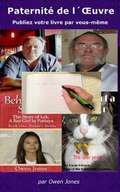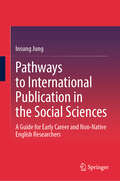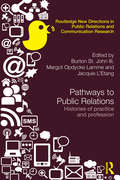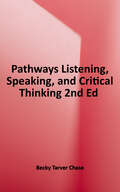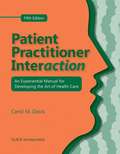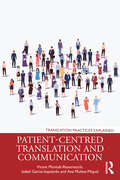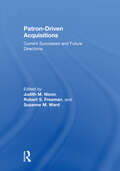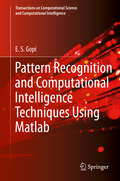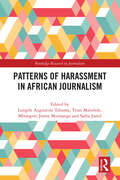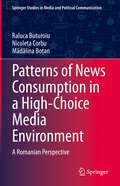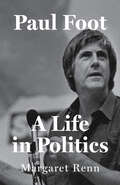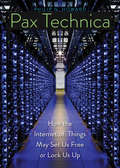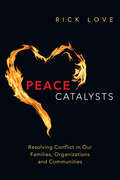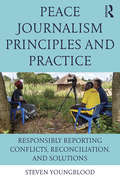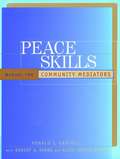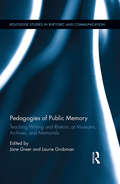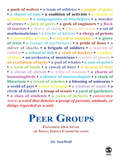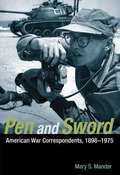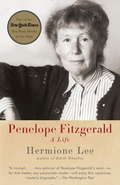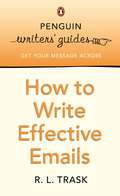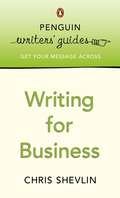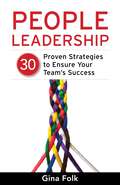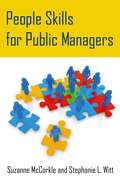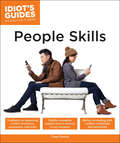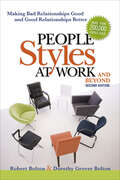- Table View
- List View
Paternité de l´œuvre: Publiez votre livre par vous-même
by Owen JonesCe livre constitue un matériel d´assistance pour ceux qui veulent écrire, écrivent ou ont écrit un livre. Il sert de guide à l´écriture et à l´auto-publication. Il n´est pas censé être un guide détaillé sur le style, cependant, vous pouvez également trouver quelques conseils à ce sujet. Alors, pour ce faire, nous partons du principe que vous êtes sur le point de commencer à écrire, vous êtes en train d´écrire ou que vous avez écrit un « manuscrit électronique », et que vous voulez savoir comment le publier vous-même auprès des grands éditeurs et distributeurs sous forme d´impression et en livre électronique. Le manuscrit électronique est un oxymore, nous utiliserons donc le mot «script» dans le reste du livre. Votre script est peut-être près pour l'impression ou pas, mais ce livre vous aidera à tout régler. En plus de la mise en forme de votre script, le présent livre vous aidera également à choisir où le publier, comment le publier, comment obtenir une couverture, comment le promouvoir, où le vendre et tout ce dont vous devez faire pour que les gens achètent votre livre. J'ai écrit et auto-publié plus de 110 de mes propres livres et aidé d´autres auteurs à publier leurs livres. J'ai maintenant une société d'édition appelée « Megan Publishing Services » accessible en ligne. En plus de cela, j'ai un script que j'ai fini d'écrire il y a quelques jours et je vais utiliser mon expérience pour le publier comme modèle utilisé dans ce livre et je vais tester le processus en publiant ce livre. Par conséquent, en lisant ce livre, vous suivrez la publication réelle «en direct» d´un vrai livre en temps figé. Le livre fait partie de ma collection « Megan Series » et s'appelle « Megan's School Trip ». Vous pouvez vérifier qu'il est en vente en ligne quand vous le souhaitez. Je partagerai également avec vous mon «plan de promotion à trente et un poi
Pathways to International Publication in the Social Sciences: A Guide for Early Career and Non-Native English Researchers
by Insung JungThis guide offers a clear step-by-step approach for graduate students and early-career researchers, especially non-native English speakers, seeking to publish in international journals in the social sciences. It provides practical strategies for preparing, submitting, and refining research papers, helping researchers navigate the challenges of academic publishing. With 21 chapters, the guide covers every stage of writing, revising, and submission, while addressing the unique obstacles faced by non-native English speakers. The guide helps researchers identify reputable journals, avoid predatory ones, and use digital tools to meet international standards. It then provides a structured roadmap that simplifies the publication process, covering steps like journal selection, writing compelling abstracts, and drafting the methods and results sections. By the end of the guide, it is expected that researchers will have a strong first draft or, ideally, a submission-ready manuscript. The guide also addresses language barriers, cultural differences, and unfamiliarity with international conventions. It offers practical solutions for improving English writing, utilizing digital tools, responding to peer reviews, and managing revisions effectively. It emphasizes ethical guidelines like avoiding plagiarism, properly crediting co-authors, and ensuring research transparency to help researchers meet global standards. Unlike other research guides, this one is specifically tailored to early career and non-native English researchers working in social science disciplines. It offers practical strategies and real-world examples to equip researchers—and teachers of research methods and academic writing—with a framework for achieving publishing success in global academia.
Pathways to Public Relations: Histories of Practice and Profession (Routledge New Directions in Public Relations & Communication Research)
by Burton St. John Margot Opdycke Lamme Jacquie L’EtangOver the centuries, scholars have studied how individuals, institutions and groups have used various rhetorical stances to persuade others to pay attention to, believe in, and adopt a course of action. The emergence of public relations as an identifiable and discrete occupation in the early 20th century led scholars to describe this new iteration of persuasion as a unique, more systematized, and technical form of wielding influence, resulting in an overemphasis on practice, frequently couched within an American historical context. This volume responds to such approaches by expanding the framework for understanding public relations history, investigating broad, conceptual questions concerning the ways in which public relations rose as a practice and a field within different cultures and countries at different times in history. With its unique cultural and contextual emphasis, Pathways to Public Relations shifts the paradigm of public relations history away from traditional methodologies and assumptions, and provides a new and unique entry point into this complicated arena.
Pathways: Listening, Speaking, and Critical Thinking 1
by Becky Tarver ChasePathways, Second Edition, is a global, five-level academic English program. Carefully-guided lessons develop the language skills, critical thinking, and learning strategies required for academic success. Using authentic and relevant content from National Geographic, including video, charts, and other infographics, Pathways prepares students to work effectively and confidently in an academic environment.
Patient Practitioner Interaction: An Experiential Manual for Developing the Art of Health Care
by Carol M. DavisOver 20 years ago, Dr. Carol M. Davis created the path for teaching health care professionals how to develop self-awareness and communication skills critical to providing ethical, compassionate, and professional treatment and care to their patients. That path is Patient Practitioner Interaction: An Experiential Manual for Developing the Art of Health Care, now in its Fifth Edition. While the ways of communication have evolved over the last 23 years, the face-to-face role of the practitioner and patient has not. With technology having a large presence in health care, the personal interaction and comfort provided by the health care professional serves an even more important purpose in facilitating healing with therapeutic presence. Patient Practitioner Interaction, Fifth Edition begins with chapters that assist students in self-awareness and understanding of their own history in developing their values and communication skills. This then guides the student into learning how to differentiate personal values from professional values. In the remaining chapters, Dr. Carol M. Davis and her contributors take Patient Practitioner Interaction, Fifth Edition into the heart of the text: teaching actual skill development in communicating with patients, as well as skills in diagnosis, prognosis, and treatment. The updated exercises at the end of each chapter encourage an essential element in the inculcation of these fundamental skills -- reflection and personalization of the material to ones own story. New in the Fifth Edition: * A new chapter on communicating about spirituality that teaches health care professionals to better assess the needs of patients and families dealing with hope, faith, and despair * New material on communicating in the information age * A reorganization of the chapters, contemporary terminology, and references * New and updated exercises at the end of each chapter in the book.
Patient-Centred Translation and Communication (Translation Practices Explained)
by Vicent Montalt-Resurrecció Isabel García-Izquierdo Ana Muñoz-MiquelIn response to the growing importance and spread of patient-centred care, the need to empower patients and the trend towards democratising specialised knowledge in health care, this book puts patients centre stage and provides concepts, methods and learning materials to enhance effective communication with patients and relatives in health care settings.Opening chapters establish the conceptual and methodological framework needed to understand patient-centredness, the crucial role of context and culture, the range of communicative situations and text genres involved and the diversity of modes, formats and media in which patient-centred translation and communication take place. Subsequent chapters raise awareness of the importance of carefully defining the target audience and producing understandable and empathetic messages and provide analytical tools for making decisions in these three key areas. The concluding chapter offers avenues for research in patient-centred translation and communication with the hope of bridging the gap between practice and research and advancing this growing field of inquiry.Including activities, resources, summaries, further reading and pointers to further research in each chapter, this is the essential guide for all translators and interpreters, students and professionals working in this area of translation studies, health care and communication studies.
Patron-Driven Acquisitions: Current Successes and Future Directions
by Judith M. Nixon Robert S. Freeman Suzanne M. WardFor over a decade, some academic libraries have been purchasing, rather than borrowing, recently published books requested by their patrons through interlibrary loan. These books had one circulation guaranteed and so appealed to librarians who were concerned about the large percentage of books selected and purchased by librarians but never checked out by their patrons. Early assessments of the projects indicated that patrons selected quality books that in many cases were cross disciplinary and covered emerging areas of scholarly interest. However, now we have a significant database of the ILL purchase records to compare these titles with books selected through normal methods. The projects described in this book present a powerful argument for involving patrons in the book selection process.This book looks at patron-driven acquisitions for printed books at Purdue University, the University of Nebraska-Lincoln and the University of Illinois, as well as exploring new programs that allow patrons to select e-books or participate in other innovative ways in building the library collections.This book was published as a special issue of Collection Management.
Pattern Recognition and Computational Intelligence Techniques Using Matlab (Transactions on Computational Science and Computational Intelligence)
by E. S. GopiThis book presents the complex topic of using computational intelligence for pattern recognition in a straightforward and applicable way, using Matlab to illustrate topics and concepts. The author covers computational intelligence tools like particle swarm optimization, bacterial foraging, simulated annealing, genetic algorithm, and artificial neural networks. The Matlab based illustrations along with the code are given for every topic. Readers get a quick basic understanding of various pattern recognition techniques using only the required depth in math. The Matlab program and algorithm are given along with the running text, providing clarity and usefulness of the various techniques.Presents pattern recognition and the computational intelligence using Matlab;Includes mixtures of theory, math, and algorithms, letting readers understand the concepts quickly;Outlines an array of classifiers, various regression models, statistical tests and the techniques for pattern recognition using computational intelligence.
Patterns of Harassment in African Journalism (Routledge Research in Journalism)
by Sadia Jamil Trust Matsilele Lungile Augustine Tshuma Mbongeni Jonny MsimangaThis volume examines the trends and patterns of journalists’ harassment in Africa and assesses the policy interventions and protection mechanisms that are put into place in the region.Drawing from case studies from selected African countries, an international team of authors offer a broad insight into the state of harassment across the continent, while building new theoretical perspectives that are also context-specific. The chapters bring previous theories and research up to date by addressing the continual change and development of new discourses, including the use of big data and artificial intelligence in harassing and intimidating journalists and mental health issues affecting journalists in their line of duty. More so, the authors argue that the state and form of harassment is not universal, as location and context are some of the key factors that influence the form and character of harassment.Offering new theoretical insights into the scope of journalism practices in Africa, this book will interest students and scholars of journalism, African studies, political science, media and communication studies, journalism practice and gender studies.
Patterns of News Consumption in a High-Choice Media Environment: A Romanian Perspective (Springer Studies in Media and Political Communication)
by Raluca Buturoiu Nicoleta Corbu Mădălina BoțanBased on a Romanian case study, this book sheds light on the supply and demand of news and information in the current digital era, dominated by unprecedented dramatic changes. In addition to identifying patterns of journalistic reporting and news consumption, the book offers a thorough approach to how the classic theories in media and communication studies can be reinterpreted in the current attention economy and media abundance paradigm. The research data included in this book provide a snapshot of media consumption patterns and encompass experts’ views and predictions about how media habits and diets might evolve.The book will appeal to students, researchers, and scholars of media and communication studies, political communication, and journalism, as well as practitioners interested in a better understanding of news consumption patterns in a high-choice media environment.
Paul Foot: A Life in Politics
by Margaret RennA portrait of a brilliant journalist and tireless campaigner for justicePaul Foot was one of the most influential investigative reporters of his generation. For nearly fifty years, he was the scourge of corrupt politicians and dodgy businessmen, a champion of the underdog.In this, the first biography of Paul Foot, journalist Margaret Renn traces Foot&’s personal, political and professional trajectories, placing his life and works within the long arc of postwar Britain. Drawing on extensive interviews with those close to him, and utilizing her unparalleled knowledge of his prodigious output, the book brings the many different faces of Paul Foot together into a single portrait.A prolific writer for the Daily Mirror, Private Eye, the Guardian and Socialist Worker, Foot&’s investigations broke numerous major stories. He wrote about ordinary people caught up in extraordinary events, and the issues in some of his campaigns maintained their prominence long after his death in 2004: police corruption in the Stephen Lawrence case; sexual abuse in children&’s homes; the Lockerbie bombing. His books ranged from how politicians used race to win votes, through miscarriages of justice, to the politics of poetry and the failure of the vote to deliver power to the people. Paul Foot: A Life in Politics is a brilliant portrait of a committed and active socialist, orator and relentless investigator of wrongdoing.
Pax Technica
by Philip N. HowardShould we fear or welcome the internet's evolution? The "internet of things" is the rapidly growing network of everyday objects--eyeglasses, cars, thermostats--made smart with sensors and internet addresses. Soon we will live in a pervasive yet invisible network of everyday objects that communicate with one another. In this original and provocative book, Philip N. Howard envisions a new world order emerging from this great transformation in the technologies around us. Howard calls this new era a Pax Technica. He looks to a future of global stability built upon device networks with immense potential for empowering citizens, making government transparent, and broadening information access. Howard cautions, however, that privacy threats are enormous, as is the potential for social control and political manipulation. Drawing on evidence from around the world, he illustrates how the internet of things can be used to repress and control people. Yet he also demonstrates that if we actively engage with the governments and businesses building the internet of things, we have a chance to build a new kind of internet--and a more open society.
Peace Catalysts: Resolving Conflict in Our Families, Organizations and Communities
by Rick Love"If it is possible, as far as it depends on you, live at peace with everyone." —Romans 12:18 Conflict happens. It's a painful reality of life in a fallen world. But we don't need to be content with broken relationships—conflict resolution is possible. God's intention for us and for the world is for all to live in peace with one another, and Christian peacemakers have an unparalleled opportunity to be true ambassadors of reconciliation. Rick Love, founder and president of Peace Catalyst International, shares the principles that have guided his peacemaking efforts around the world. Masterfully blending Scripture and personal experience, he provides a biblical framework for how the God of peace seeks restoration for all who experience conflict—in the home and workplace and even across international borders. With the life of Jesus as the prime example, Love equips and empowers peacemakers of all stripes to integrate evangelical witness with commitment to reconciliation. We can walk in the footsteps of Jesus as catalysts of peace, bringing transformation and hope to a world crying out for healing and forgiveness.
Peace Journalism Principles and Practices: Responsibly Reporting Conflicts, Reconciliation, and Solutions
by Steven YoungbloodLong-time peace journalist Steven Youngblood presents the foundations of peace journalism in this exciting new textbook, offering readers the methods, approaches, and concepts required to use journalism as a tool for peace, reconciliation, and development. Guidance is offered on framing stories, ethical treatment of sensitive subjects, and avoiding polarizing stereotypes through a range of international examples and case studies spanning from the Iraq war to the recent unrest in Ferguson, Missouri. Youngblood teaches students to interrogate traditional media narratives about crime, race, politics, immigration, and civil unrest, and to illustrate where—and how—a peace journalism approach can lead to more responsible and constructive coverage, and even assist in the peace process itself.
Peace Skills: Manual for Community Mediators
by Ronald Kraybill Alice Evans Robert EvansHow to be a "peacebuilder" and mediate between conflicted entities.
Pedagogies of Public Memory: Teaching Writing and Rhetoric at Museums, Memorials, and Archives (Routledge Studies in Rhetoric and Communication)
by Jane Greer Laurie GrobmanPedagogies of Public Memory explores opportunities for writing and rhetorical education at museums, archives, and memorials. Readers will follow students working and writing at well-known sites of international interest (e.g., the Flight 93 National Memorial in Shanksville, Pennsylvania, and the U.S. Holocaust Memorial Museum), at local sites (e.g., vernacular memorials in and around Muncie, Indiana and the Central Pennsylvania African American Museum in Reading, Pennsylvania), and in digital spaces (e.g., Florida State University’s Postcard Archive and The Women’s Archive Project at the University of Nebraska Omaha). From composing and delivering museum tours, to designing online memorials that challenge traditional practices of public grief, to producing and publishing a magazine containing the photographs and stories of individuals who lived through historic moments in the Freedom Struggle, to expanding and creating new public archives – the pedagogical projects described in this volume create richly textured learning opportunities for students at all levels – from first-year writers to graduate students. The students and faculty whose work is represented in this volume undertake to reposition the past in the present and to imagine possible new futures for themselves and their communities. By exploring the production of public memory, this volume raises important new questions about the intersection of rhetoric and remembrance.
Peer Groups: Expanding Our Study of Small Group Communication
by SunWolfClans, cliques, clubs, or classmates: Students of group communication should be encouraged to think critically about concepts to the groups that matter to them most—peers. Peer Groups is the first textbook to explore group communication dynamics with this vital group. Drawing on a combination of traditional and new theories, Dr. SunWolf uses an inviting writing style, shares the words and provocative thinking of real world group members, and draws on research from social psychology, communication, and group dynamics. This innovative book offers suggestions for critical thinking and new behaviors in students' own peer groups and will inspire further exploration of small group dynamics.
Pen and Sword: American War Correspondents, 1898-1975
by Mary S. ManderAddressing the ever-changing, overlapping trajectories of war and journalism, this introduction to the history and culture of modern American war correspondence considers a wealth of original archival material. In powerful analyses of letters, diaries, journals, television news archives, and secondary literature related to the U. S. 's major military conflicts of the twentieth century, Mary S. Mander highlights the intricate relationship of the postmodern nation state to the free press and to the public. Pen and Sword: American War Correspondents, 1898-1975 situates war correspondence within the larger framework of the history of the printing press to make perceptive new points about the nature of journalism and censorship, the institution of the press as a source of organized dissent, and the relationship between the press and the military. Fostering a deeper understanding of the occupational culture of war correspondents who have accompanied soldiers into battle, Mander offers interpretive analysis of the reporters' search for meaning while embedded with troops in war-torn territories. Broadly encompassing the history of Western civilization and modern warfare, Pen and Sword prompts new ways of thinking about contemporary military conflicts and the future of journalism.
Penelope Fitzgerald: A Life
by Hermione LeeONE OF THE NEW YORK TIMES BOOK REVIEW’ S 10 BEST BOOKS OF THE YEAR<P> The acclaimed biographer of Edith Wharton and Virginia Woolf gives us an intimate portrait of one of the most quietly brilliant novelists of the twentieth century.<P> Penelope Fitzgerald was a great English writer whose career didn't begin until she was nearly sixty. She would go on to win some of the most coveted awards in literature—the Booker Prize and the National Book Critics Circle Award. <P> Now, in an impeccable match of talent between biographer and subject, Hermione Lee, a master biographer and one of Fitzgerald's greatest champions, gives us this remarkable writer’s story. Lee’s critical expertise is on dazzling display on every page, as it illuminates this extraordinary English life. Fitzgerald, born into an accomplished intellectual family, the granddaughter of two bishops, led a life marked by dramatic twists of fate, moving from a bishop’s palace to a sinking houseboat to a last, late blaze of renown. We see Fitzgerald’s very English childhood in the village of Hampstead; her Oxford years, when she was known as the “blonde bombshell”; her impoverished adulthood as a struggling wife, mother and schoolteacher, raising a family in difficult circumstances; and the long-delayed start to her literary career. <P> Fitzgerald’s early novels draw on her own experiences—working at the BBC in wartime, at a bookshop in Suffolk, at an eccentric stage school in the 1960s—while her later books open out into historical worlds that she, magically, seems to entirely possess: Russia before the Revolution, postwar Italy, Germany in the time of the Romantic writer Novalis. Fitzgerald’s novels are short, spare masterpieces, and Hermione Lee unfurls them here as works of genius. Expertly researched, written out of love and admiration for this wonderful author’s work, Penelope Fitzgerald is literary biography at its finest—an unforgettable story of lateness, persistence and survival.
Penguin Writers' Guides: How to Write Effective Emails
by R L TraskThe Penguin Writers' Guides series provides authoritative, succinct and easy-to-follow guidance on specific aspects of written English. Whether you need to brush up your skills or get to grips with something for the first time, these invaluable Guides will help you find the best way to get your message across clearly and effectively.Many of us are spending more and more time using emails, especially at work. This practical guide steers you through all the basics and 'netiquette' of emailing strangers, business contacts and colleagues: from setting up an email account, presentation and formatting of your emails to how to avoid offensive blunders and the legal issues surrounding this kind of writing. It offers indispensable guidance for simple and direct writing - including cultural differences, appropriate language and common pitfalls - so that your emails give the best possible impression.
Penguin Writers' Guides: Writing for Business
by Chris ShevlinThe Penguin Writers' Guides series provides authoritative, succinct and easy-to-follow guidance on specific aspects of written English. Whether you need to brush up your skills or get to grips with something for the first time, these invaluable Guides will help you find the best way to get your message across clearly and effectively.Business demands many different types of writing skills - from creating proposals and presentations to compiling reports and briefings. This one-stop, no-nonsense guide shows you how to improve your writing at work: including how to discover your strengths and weaknesses, how to identify your audience, how to develop your argument and keep information flowing while avoiding overused jargon. It shows how to make the most of the language you use and make your writing effective and influential.
People Leadership: 30 Proven Strategies to Ensure Your Team's Success
by Gina FolkDo you find yourself and your employees less engaged and less productive in the workplace than you would like? According to a Gallup poll, more than 70 percent of the American workforce today is &“unengaged&”—which means that most of the people in your organization are only showing up to work to go through the motions and collect their paycheck. But there&’s something you can do to change that. In People Leadership, Gina Folk covers thirty proven techniques that she learned and utilized during a twenty-five-year career managing people at a Fortune 500 company. Unlike many of the leadership theories you&’ll find out there, Folk&’s teachings have been implemented and shown to work with real people in real situations. Using Folk&’s practices, any individual charged with managing or supervising others at any level can learn to re-engage their employees and improve their company&’s productivity—and become the boss they&’ve always wanted to be.
People Skills for Public Managers
by Suzanne Mccorkle Stephanie WittThis book fills the need for a communication-based, public sector framed book. The authors combine just enough basic theory about communication with specific skill development in areas of immediate interest to those who work in the public sector. It also features a strong "practice" orientation, with plentiful boxed applications (Insights from the Field, Skill Development boxes, Case Studies). It concludes with an especially useful summary chapter that describes the ten essential skills for successful communication.
People Skills: Helpful Guidance on Interacting in Any Situation (Idiot's Guides)
by Casey HawleyPeople skills — also known as interpersonal skills — are key to succeeding in work and in life. Many people struggle with these specific skills, particularly in an increasingly digital world. Idiot's Guides: People Skills offers expert advice on the foundations of effective communication, tips on understanding and maximizing nonverbal communication, ways to handle conflict and difficult conversations, pointers on being more influential and persuasive, and a primer for public speaking to small or large groups.
People Styles at Work and Beyond: Making Bad Relationships Good and Good Relationships Better
by Robert Bolton Dorothy Grover BoltonAs cofounders of the leadership coaching and training firm Ridge Associates, authors Robert Bolton and Dorothy Grover teach that good interpersonal communication is essential to getting things done.In this comprehensive and practical guide, they offer a proven method for understanding the key behavioral styles of those around you (including your own) and explain how you can leverage the strengths and weaknesses of each to relate to others more winsomely.People Styles at Work . . . and Beyond teaches you how to:recognize how they come across to other coworkers;read others' body language and behavior to identify the best ways to work with them;make small adjustments that will dramatically increase the quality and productivity of their interactions;find common ground with different people while retaining their individuality;relate less defensively and more effectively no matter how others act.At work, at home, and even while you&’re out running errands, your ability to relate to others affects how well you get things done. This book provides a self-assessment to determine which style you are and then uses that information to gauge how you should interact with others.Now including all new material on personal relationships, parenting, and more, People Styles at Work . . . and Beyond is the ultimate how-to guide that can help you avoid conflicts and enhance important relationships.
